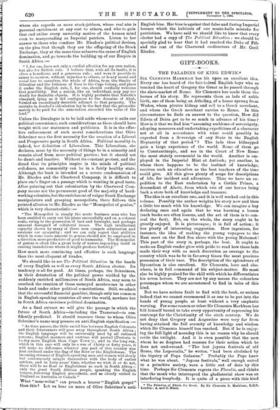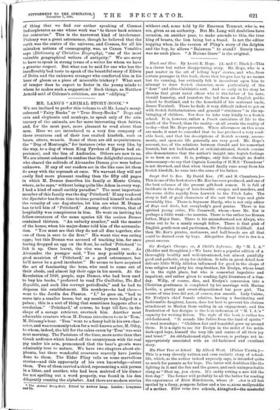GIFT-BOOKS.
THE PALADINS OF KING EDWIN.*
SIR CLEMENTS MARKHAM has hit upon an excellent idea. Every one has heard of the fair-haired English boys who so touched the heart of Gregory the Great as he passed through the slave-market of Rome. Sir Clements has made them the heroes of his story. He represents them as lads of noble birth, one of them being an Atheling, of a house sprung from Woden, whom pirates kidnap and sell to a Greek merchant, and whom the Greek merchant carries to Rome. In this circumstance he finds an answer to the question, How did Edwin of Deira get to be so much in advance of his time? How is it that we find him "assuming emblems of sovereignty, adopting measures and undertaking expeditions of a character not at all in accordance with what could possibly be expected from a Sovereign of any State in the English Heptarcby of that period " ? The lade thus kidnapped gain a large experience of the world. Some of them go to Constantinople, and see in the Court of New Rome the most stately ceremonial in the world. Another is em- ployed in the Imperial Mint at Antioch; yet another, in whom there happens to be the instinct of knowledge, receives such an education as the best teachers of the time could give. All this gives plenty of scope for descriptions of life, for incident and adventure. Thus we have an ex- pedition to the East undertaken by a Gothic Prince, a descendant of Alaric, from which two of our heroes bring back a store both of knowledge and treasure.
The idea is an excellent one, and it is well worked out in this volume. Possibly the author weights his story now and then a little too much with his knowledge. We can imagine a boy declaring once and again that he was learning a lesson (such books are often lessons, and the art of them is to con- ceal the fact). But, on the whole, the story ought to be greatly enjoyed. It is picturesque ; it is full of action ; it has plenty of interesting suggestion. How ingenious, for instance, the idea of making the young voyagers to the East meet on the Red Sea shore with the young Mahomet ! This part of the story is, perhaps, the best. It ought to make an English reader glow with pride to read how these lads made their way with as much discretion as courage to the country which was to be in far-away times the most precious possession of their race. The description of the splendours of Byzantium is also excellent. Sir Clements, here and else- where, is in full command of his subject-matter. He must also be highly praised for the skill with which he differentiates his seven heroes. They are not by any means the colourless personages whom we are accustomed to find in tales of this kind.
But we have serious fault to find with the book, so serious indeed that we cannot recommend it as one to be put into the hands of young people, at least without a very emphatic warning. For some reason or other Sir Clements Markham has felt himself bound to take every opportunity of expressing his contempt for the Christianity of the sixth century. We do not deny that Gregory and Augustine were very far from having attained the full serenity of knowledge and wisdom which Sir Clements himself has reached. But if he is enjoy- ing the full light of noonday this is no reason why he should revile the twilight. And it is even possible that the men whom he so despises had reasons for their action which he does not understand. "The last joyous festivals of old Rome, the Lnpercalia," he writes, "had been abolished by the bigotry of Pope Gelasius." Probably the Pope knew what he was about. "Joyous festivals," well enough suited to a primitive society, were a little out of date by this time. Perhaps Sir Clements regrets the Floralia, and thinks that the monk who interrupted the gladiatorial show was an interfering busybody. It is quite of a piece with this kind
• The Paladins of Edwin the Great. By Sir Clemente R. Markham, K.0.11. London: A. and 0. }Mack.
of thing that we find our author speaking of Cosines Indicopleustes as one whose work was "to throw back science for centuries." This is the narrowest kind of intolerance. Ptolemy was a great astronomer, though he believed that the earth was the centre of the universe, and Cosmas, for all his mistaken notions of cosmography, was, as Canon Venables says (Dictionary of Christian Biography), "one of the most valuable geographical writers of antiquity." We are sorry to have to speak in strong terms of a writer for whom we have a genuine respect. But what can be said for one who has the insufferably bad taste to speak of the beautiful story of Edwin of Deira and the unknown stranger who comforted him in his hoar of gloom as a piece of miserable trickery ? What sort of temper does he expect to foster in the young minds to whom he makes such a suggestion ? Such things, as Matthew Arnold said of Colenso's criticism, are not "edifying."



















































 Previous page
Previous page